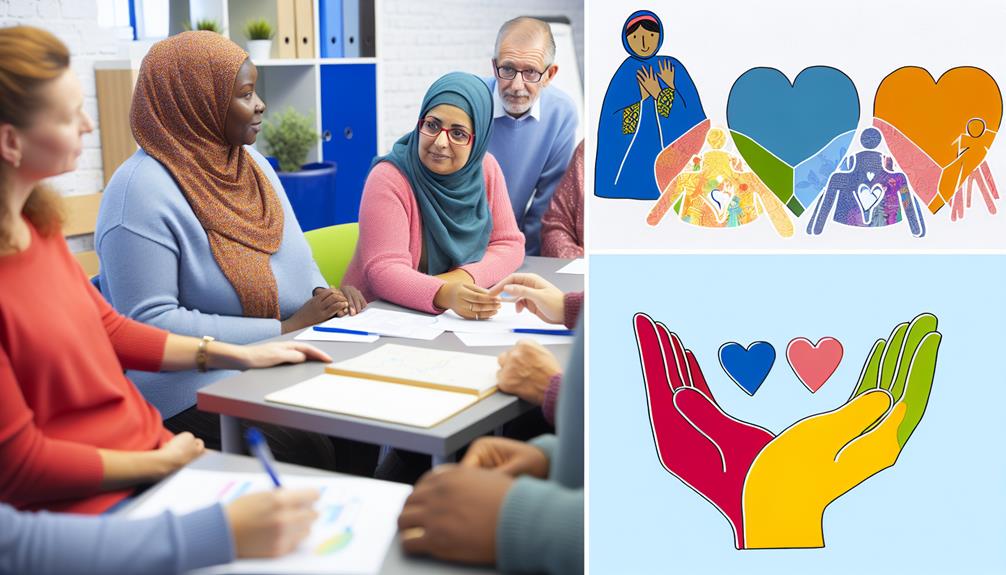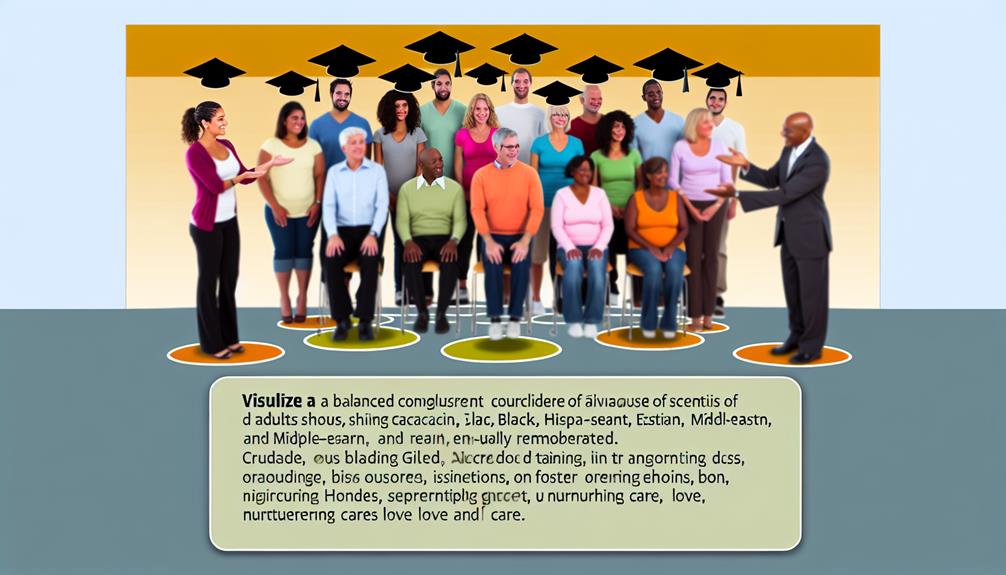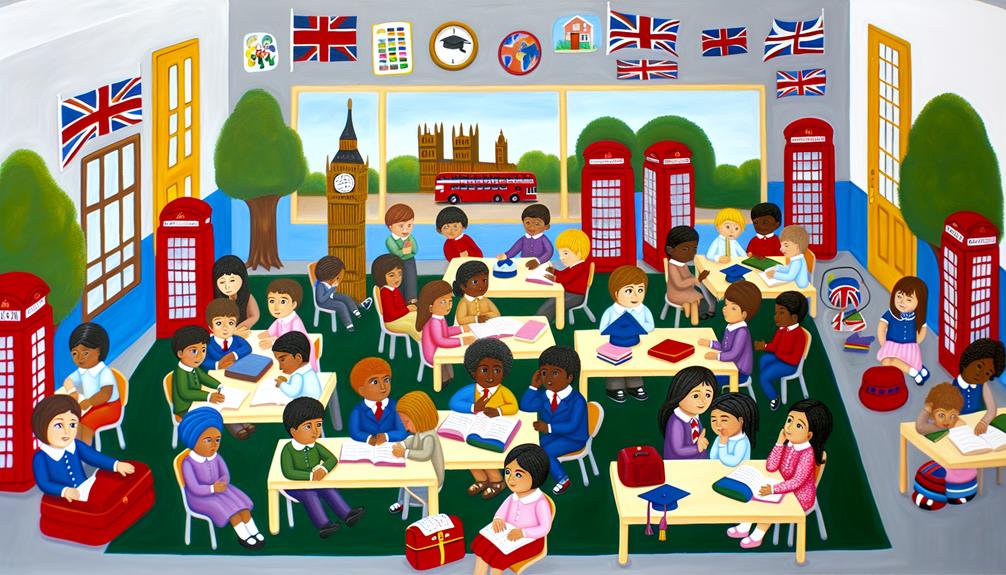To become a foster carer in the UK, you'll need to complete essential training programs. These equip you with necessary skills, knowledge, and insights into child psychology. You'll learn to understand family dynamics, handle children's traumatic experiences, and provide emotional support. The training will also cover legal and procedural aspects of foster caring, enhancing your caregiving skills. You must complete these programs to be certified as a foster carer, alongside background checks, health assessments, and panel interviews. Once certified, you'll enjoy continuous support, including financial assistance and advice networks. Stick with us, there's so much more to uncover in your fostering journey.
Key Takeaways
- Identify appropriate foster carer training programs which focus on adoption readiness, trauma-informed care, and child psychology.
- Complete the required training to enhance your caregiving skills and understand essential legal aspects of fostering.
- Ensure you meet the age, health, and home environment requirements for fostering as per UK fostering legislation.
- Undergo the certification process, including background check, health assessment, home study, and panel interview.
- Avail of continuous support post-training, including professional guidance, financial assistance, and support networks to thrive in your role.
Understanding Foster Care in the UK

Delving into the world of foster care in the UK, you'll find it's a system built on providing temporary homes for children who, for various reasons, can't live with their birth families. It's a system, governed by UK fostering legislation, aiming to protect the rights of these vulnerable children.
Contrary to common foster care misconceptions, foster carers don't replace a child's birth family. Instead, they provide a safe and nurturing environment until the child can return home, move to adoptive families or live independently. The aim is always for reunification, if it's in the child's best interest.
UK fostering legislation dictates specific criteria for becoming a foster carer. You must be at least 21 years old, have a spare room, and be in good health physically and mentally. However, you don't need to be married or own a home. The legislation also safeguards every child in foster care gets their needs met, which includes their right to education, healthcare, and freedom from harm.
Understanding the realities of foster care in the UK is important. Not only does it debunk foster care misconceptions, but it also highlights the significance of this system in safeguarding children's lives and future.
Essential Skills for Foster Parents
Having appreciated the nature of foster care in the UK, it's equally important to understand the key skills you'll need to become a successful foster parent.
First, Parenting Styles Adaptation is essential. Each child comes with their unique behavioural patterns and needs. You'll need to adjust your parenting style to suit each child's needs, ensuring they feel loved, secure, and understood. Remember, flexibility and patience are key here, as change doesn't happen overnight.
Second, you'll need Cultural Sensitivity Training. The UK is a cultural melting pot, and the children placed in your care could come from diverse backgrounds. Being sensitive to a child's cultural heritage helps them feel respected and valued. This involves understanding their traditions, language or dialect, dietary preferences, and more. It's about creating an inclusive environment that respects diversity.
Furthermore, excellent communication skills, empathy, resilience, and an understanding of child development are also essential. These skills will help you bond with the child, manage challenging behaviours, and navigate the highs and lows of foster care.
Overview of Foster Carer Training

As you start on your journey as a foster carer, it's essential to grasp the basics of foster carer training.
This includes understanding the different aspects of training programs and recognizing the benefits that such training can provide.
Understanding Foster Carer Training
In your journey to becoming a foster carer in the UK, it's crucial to grasp the intricacies of the comprehensive training programs which are tailored to equip you with the necessary skills and knowledge to provide the best possible care for children in need.
These programs explore various aspects of fostering, such as understanding family dynamics, which is vital for facilitating a smooth shift for the child into a new home environment.
Training evaluation is another pivotal element, providing an opportunity for you to assess your learning and growth as you navigate through the course.
Components of Training Programs
Foster carer training in the UK is typically comprised of several key components, each designed to help you better understand and respond to the unique needs of children in foster care. These components include understanding the child's background, managing behavior, and providing emotional support.
While the training challenges may seem intimidating, remember that you're not alone. Support networks are integral to these programs, offering you a chance to share experiences and gain advice from others in similar situations.
Additionally, you'll learn about the legal and procedural aspects of fostering. This holistic approach guarantees you're well-equipped to provide a safe, nurturing environment for your foster child, while also taking care of your own wellbeing.
Benefits of Foster Training
Starting a foster carer training program equips you with essential skills and knowledge, paving the way for numerous benefits both for you and the children you'll be caring for.
The training effectiveness is immediately noticeable as you become more confident and competent, able to respond effectively to the complex needs of foster children.
You'll also experience personal growth, learning to practice patience, empathy, and resilience, qualities that aren't just useful in fostering, but in every aspect of life.
Understanding children's behaviors, their background, and knowing how to support their education and health, makes you an instrumental part in their journey to a brighter future.
Embrace this training as a vital step towards mastering the art of foster care.
Benefits of Foster Care Training

As you start on your journey as a foster carer, it's essential to understand the value of training programs.
Not only do these equip you with enhanced caregiving skills, but they also foster emotional well-being and provide you with important legal knowledge.
This thorough preparation ultimately positions you to offer the most effective care and support to the children entrusted in your care.
Enhancing Caregiving Skills
Why not enhance your caregiving skills with the myriad benefits offered by foster care training programs in the UK? These programs provide you with valuable child psychology insights and equip you with trauma informed care techniques, both essential in fostering.
Here's a glimpse of what you'll learn:
| Skills | Description | Benefits |
|---|---|---|
| Child Psychology Insights | Understanding emotional, cognitive development | Effective communication, better support |
| Trauma Informed Care | Recognising, responding to trauma effects | Improved care, foster child's recovery |
| Practical Caregiving Skills | Daily care, behavioural management | Decreased stress, enhanced child's wellbeing |
Ultimately, these training programs seek to prepare you fully for your fostering journey. They'll bolster your confidence and competence in your caregiving role, ensuring you can provide the safest, most nurturing environment for your foster child.
Emotional Well-being Improvement
Through the foster care training programs, you'll gain tools to greatly enhance your emotional well-being, equipping you to handle the highs and lows of fostering with resilience and positivity. A key part of this training centers on emotional intelligence development. You'll learn how to identify and manage your emotions, fostering a deeper understanding of yourself and the children in your care.
Additionally, these programs offer robust mental health support, providing guidance on self-care and stress management techniques. This not only bolsters your resilience but also models healthy emotional habits for the children you're supporting. Remember, being a foster carer isn't just about providing a home, but also being an emotionally stable and supportive figure in a child's life. This training empowers you to be just that.
Legal Knowledge Enhancement
In addition to emotional support, foster care training programs also equip you with essential legal knowledge that's vital in navigating the complex foster care system. Understanding court procedures and adoption processes, for example, will enable you to better advocate for the child under your care.
It's important that you're familiar with how court hearings work, what your role in them might be, and how decisions are made. Similarly, knowing the ins and outs of adoption processes can help you effectively ease the change if the child you're caring for is adopted.
Specific Training Programs for Foster Carers

As a potential foster carer in the UK, you'll find a variety of specific training programs designed to equip you with the necessary skills and knowledge to provide the best care for your foster children. These programs focus on areas such as adoption readiness and trauma informed care, both of which are crucial in this line of work.
Adoption readiness training prepares you for the unique challenges that come with helping a child adjust to a new family environment. It equips you with strategies to facilitate a smooth shift and build strong bonds with your foster child. This training is often eye-opening, providing a realistic view of the adoption process and the potential difficulties you may encounter.
On the other hand, trauma informed care training ensures you're well-prepared to handle children who've experienced traumatic events. You'll learn how trauma affects a child's development and behaviour, and how to respond effectively. This training equips you with the tools to create a safe, supportive environment that can help a child heal.
Navigating the Foster Carer Certification Process
After gaining the necessary skills from these specific training programs, you might wonder what the next step is – it's time to navigate the foster carer certification process. The journey may seem challenging, but with clear understanding of the certification prerequisites and assessment procedures, you'll be well-prepared.
| Certification Prerequisites | Assessment Procedures |
|---|---|
| Completion of training | Home study |
| Background check | Panel interview |
| Health assessment | Post-approval review |
Firstly, you need to make sure you've met all certification prerequisites, such as completing the required training and passing a background check and health assessment. These prerequisites ensure you're fit, capable and ready to provide a safe environment for the child.
Next, let's discuss the assessment procedures. The 'home study' is an in-depth review of your lifestyle, including your home environment. The 'panel interview' involves answering various questions about your understanding and readiness to foster. Finally, a 'post-approval review' is conducted once you've been approved as a foster carer.
Continuous Support for Trained Foster Carers

Once you're certified as a foster carer, you're not left to navigate the journey alone – continuous support is readily available to help you thrive in your new role. This assistance comes in various forms to guarantee your success and the wellbeing of the child in your care.
- Support Networks: Connecting with a community of fellow foster carers can provide invaluable advice, camaraderie, and understanding. These networks, either online or in-person, offer a platform to share experiences, seek advice, or simply have a sympathetic ear to listen to you.
- Professional Guidance: Post-certification, you'll receive ongoing training and professional development opportunities. This includes access to counselling services, professional consultants, and educational resources. These tools are designed to support you in handling unique challenges and enhancing your skills.
- Financial Assistance: You're not expected to shoulder the financial responsibilities alone. Assistance is provided to cover the essentials for the child's needs, such as education, clothing, and daily living costs, making sure that you can focus on providing a nurturing environment.
Success Stories From UK Foster Carers
While the support you'll receive as a foster carer is invaluable, nothing illuminates the journey better than hearing from those who've walked the path before; let's hear some inspiring success stories from foster carers across the UK.
One such tale comes from Emma, a foster carer in London. Despite the Carer Challenges she faced, such as adjusting to her new role and dealing with complex emotions, she found immense joy in seeing her foster child develop and thrive. Her advice? 'Remain patient, show empathy and always remember, you're making a huge difference.'
Then, there's Paul from Manchester. He chose to foster after his children moved out. He admits to initial struggles, but the Foster Rewards, he says, far outweigh the difficulties. Watching his foster child graduate and move on to university was a proud moment he'll never forget.
Lastly, we've Sarah from Scotland. She highlights the importance of the support network and continuous training programs. Despite the inevitable hurdles, she feels privileged to offer a safe and loving home to children in need.
Their stories highlight the essence of fostering – it's challenging, yet incredibly rewarding. Truly, these carers are unsung heroes, making a difference, one child at a time.
Frequently Asked Questions
What Financial Assistance Is Available for Foster Carers in the Uk?
As a UK foster carer, you're eligible for various funding sources. These include a weekly allowance for each child, tax reliefs, and additional benefits. It's important to understand your allowance eligibility to maximize your financial assistance.
How Long Does the Process of Becoming a Foster Carer Usually Take?
You're not baking a cake! The process to become a foster carer can take around 4-6 months. It's thorough, involving Carer Support Networks and adhering to Fostering Legislation, ensuring you're fully prepared for this important role.
Are There Any Specific Educational Qualifications Required to Become a Foster Carer?
No specific educational qualifications are required to become a foster carer. However, your motivation to care for children and background checks are essential. Training programs are available to equip you with necessary skills.
Can Singles or Unmarried Couples Become Foster Carers in the Uk?
Yes, you can! Busting the foster care myths, in the UK, marital status doesn't affect your eligibility criteria. Whether you're single or an unmarried couple, if you've got love to give, you're welcome to foster.
How Does Fostering Impact Your Own Family Dynamic and Relationships?
Fostering can bring adjustment challenges to your family dynamic. It's a journey of emotional growth, affecting relationships. You'll learn to balance needs, creating a nurturing environment for everyone. It's transformative, but requires patience and understanding.
Conclusion
As you start on your journey to become a foster carer, remember, the path may be challenging, yet it's incredibly rewarding.
You're not just providing a safe haven, you're transforming lives. With the right training and continuous support, you'll be well-equipped to navigate this special calling.
Every child's story you touch will be a proof of your invaluable contribution. So, take that leap of faith, embrace the challenge and let your fostering journey begin.




